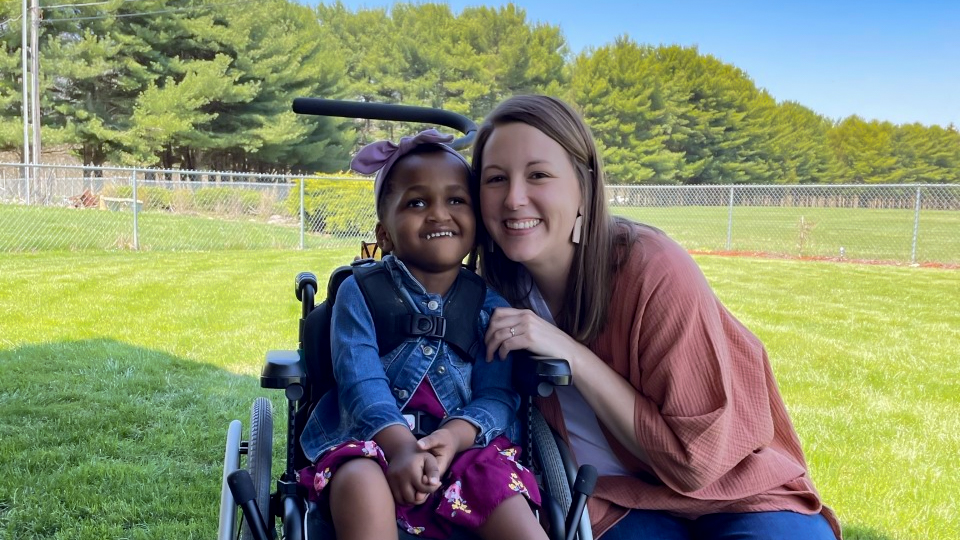
Adoptive mom Amanda Kick shares her family’s story of adopting two children with special needs from South Africa, where Holt just launched our newest adoption program.
My husband and I were on our first date when I bluntly asked if he’d be comfortable with adoption as a way to grow a family. I had adoption in my heart for years and knew I wasn’t willing to budge. Although there’s deep beauty in biological children, I just knew I wanted to parent the kids who were waiting. Thankfully, my now husband was fully on board.
We first approached our agency and learned we were too young for many countries, too poor, or our BMI was too high for others. We fit all the parameters for South Africa so it was an easy decision that felt kind of made for us. I had been on a trip to South Africa in high school so I thought I was somewhat familiar with the country.
We eagerly joined the program wanting to adopt a “healthy” baby girl, age 4 or younger.
We quickly learned that would be a long, long, long wait because young children with little to no medical needs were being adopted domestically. (Woohoo — we loved hearing that these children would be able to grow up in the country and culture of their birth!) We then learned there was actually a list of waiting kids in South Africa who were fully eligible for adoption and who had long waited for an international adoptive family.
We had to ask ourselves hard questions like, “Are we asking this child to fulfill something for us or are we asking them to come fully as themselves into our family?” We realized it wasn’t about us and was actually about these children.
It was a slow process of peeling back the layers of our desires.
We had to ask ourselves hard questions like, “Are we asking this child to fulfill something for us or are we asking them to come fully as themselves into our family?” We realized it wasn’t about us and was actually about these children.
We saw our son on the waiting list a few months after our dossier had gone to South Africa. He was 6, had “possible hearing loss” and cerebral palsy (CP). He had been on the waiting list for months! I had seen his picture every single day for months, but we had checked “no” to CP on the list of special needs we would be open to. We thought it was too complex for our family. It wasn’t until we saw videos of him walking down a hallway and smiling that we realized we were greatly misinformed about CP.
We were matched with Ben and thought, “Ok so he’s deaf. No big deal. We’ll just learn sign language,” and enrolled in a ten-week class. We had coffee with a friend who grew up with a deaf brother and asked if she thought we could do it (even though secretly, our minds were already made up). She lovingly told us we were in for a bumpy ride and shared the difficult realities of being hearing parents to a deaf child.
Meeting Our Children in South Africa
We met Ben when he only knew about 15 signs and we knew about 50. The early days were full of tantrums. Whew. As we took our screaming, crying, biting, kicking and spitting child out of a mall in South Africa, someone actually stopped and asked us if we had found a lost child. But I think what saved us those first few years was our training on trauma. We had to remind ourselves that Ben couldn’t express himself and didn’t have words. He hadn’t learned sign language yet so all he knew for six years was to physically use his body to express himself.
Imagine not being able to tell someone your tummy hurts or you’re cold or you don’t want to wear the red shoes today?
We failed over and over, but had to learn a lot of patience. We had to learn a brain in trauma can’t be reasoned with in the moment. Ben had to first regulate before we could reason with him. That took time and practice. Today, he’s nearly 10 and has the language of a 3-year-old. We are all still signing and doing our best to be fluent!
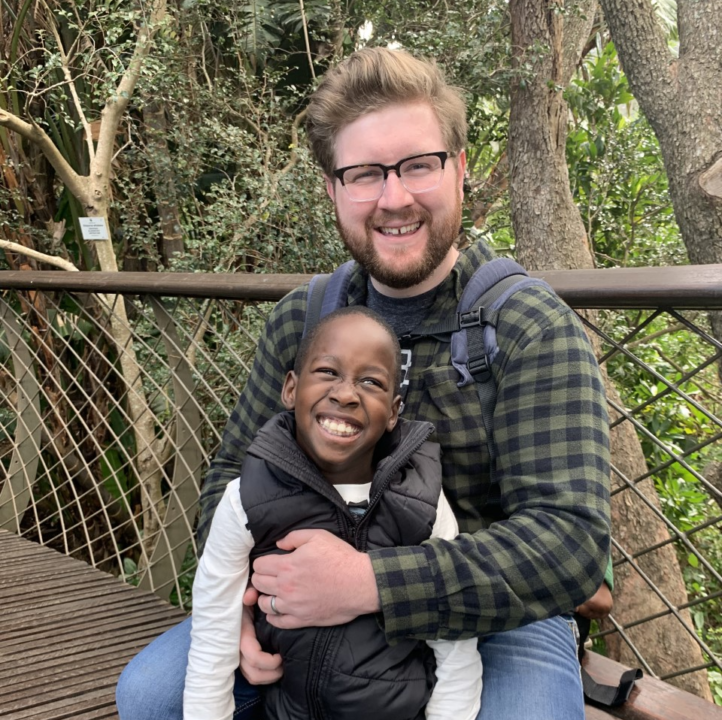
He still has tantrums, but they’re much less frequent. We continue to learn his brain isn’t wired like ours so his behaviors can’t be explained like ours. Sometimes, it happens in public and we have to learn to brush it off because a traumatized brain needs time and space to regulate. We’ve gotten a front row seat to watching our son go from not even understanding what a question is to being able to tell time, remind me that on Mondays he rides the bus, and ask if we can have pizza for dinner! It’s a treat to watch him learn new words all the time!
A year after Ben came home, we were matched with his sister, Haddie Thandolwethu. We were quickly making our way back to South Africa, this time for a 2-year-old girl who we were told was born with no cerebellum in her brain, and no ability to walk, smile, communicate or sit up on her own.
How in the world we went in two years from wanting a healthy, “perfect” baby to a toddler who would need lifelong care and therapies, I have no idea!
How in the world we went in two years from wanting a healthy, “perfect” baby to a toddler who would need lifelong care and therapies, I have no idea!
I think God just slowly peeled back the layers and made us address our selfish desires. These children didn’t owe us anything. We owed them the promise of our unconditional love.
We asked ourselves if we could change diapers for the rest of our lives and we couldn’t think of a reason why we couldn’t. We are a homebody family. We like a slow-paced schedule. We don’t like to be on the go. We couldn’t help but acknowledge that we really were a good fit for a child with special needs.
Building a Strong Attachment
When we met Haddie, unlike with Ben, our attachment was not instant. It was terrifying. Our connection to Ben was instant and fierce. But Haddie’s needs felt big and scary. She screamed hours of the day, her sensory needs meant she slammed her head on any hard surface, and she sucked her thumb until it was raw and cut open. We’d show up to a restaurant in South Africa and realize there was no wheelchair ramp. We definitely had some moments of panic where we questioned what had we just done.
Thankfully, we had well-seasoned adoptive families who let us know it was totally normal if the attachment took time. I didn’t fall in love with my spouse in a day so it was OK if I didn’t fall in love with my child in a single day.
They encouraged us to take little steps each day to attach. No step was too small or silly. For me, it was buying new clothes for her. It sounds funny now, but I wanted to buy her new outfits and try them on her. We did that to build our bond. We worked on her hair, trying new products and styles. We threw on our swimsuits and took our baths together. We took naps together. We did whatever we could to build our bond.
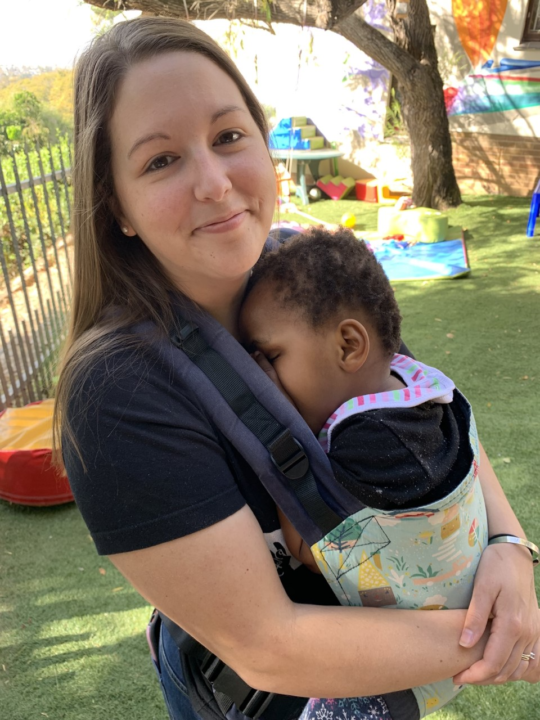
I wish I had known all along it’s OK when things don’t come instantly. It’s OK to mourn the version of your family you lose when you add a child. I wish everyone knew that.
I followed my gut. I found myself making her homemade mashed foods that helped me build attachment. Looking back now, it makes sense. Mothers and fathers care for their baby’s every need in the beginning and it forms a bond, so that’s exactly what we did.
We nurtured her every way we could. Some days, she would scream and slam her head and we would ride in the car and silently cry. We went to our court date and just trusted God that our attachment would come in time — and boy did it come!
I wish I had known all along it’s OK when things don’t come instantly. It’s OK to mourn the version of your family you lose when you add a child. I wish everyone knew that.
Although we faced many legal challenges while in South Africa, the country was a perfect host. The scenery is stunning and the hospitality is warm and inviting. We met amazing people who would stop at nothing to make us feel welcome. South Africans are communal and inviting.
Lessons We’ve Learned as Adoptive Parents
Now that we are home, we are always learning something new. We are learning about the resources available to us to parent two children with developmental disabilities. We bought a wheelchair-accessible van and put a ramp in our garage. We tried therapies and we quit therapies. We went into spaces our kids didn’t quite fit so we found new spaces. All you can do is take it one day and one step at a time. As parents, we have to keep our mental health in check and make sure all our energy doesn’t go to our kids at the expense of our own health.

If I could go back to my old self and tell her anything, I’d tell her this:
1. The weeks before court when your child is still in their care home/orphanage are not the time to form opinions about your parenting or your child. Your child is grieving the loss of everything they know and love and that can present in many behaviors. The people who love them and cared for them are also grieving. This can also make you feel uncomfortable and unsure if you’re the parent, or a visitor. Give space for everyone to grieve and let the true bonding begin after court!
2. Attachment won’t come over night and THAT IS OK! Take each baby step you can take to form your attachment. Snuggle, pick them up, read them a story, spoon-feed them, buy the cute outfit, do hair care! (I carried my 6-year-old everywhere and people stared, but it bonded us in a beautiful way.)
3. You can do hard things for the people you love. You can wipe butts. You can battle schools. You can modify your home, your schedule, your wallet, your priorities and your plans. Life is much richer when you aren’t at the center!
Amanda Kick | Adoptive Mom
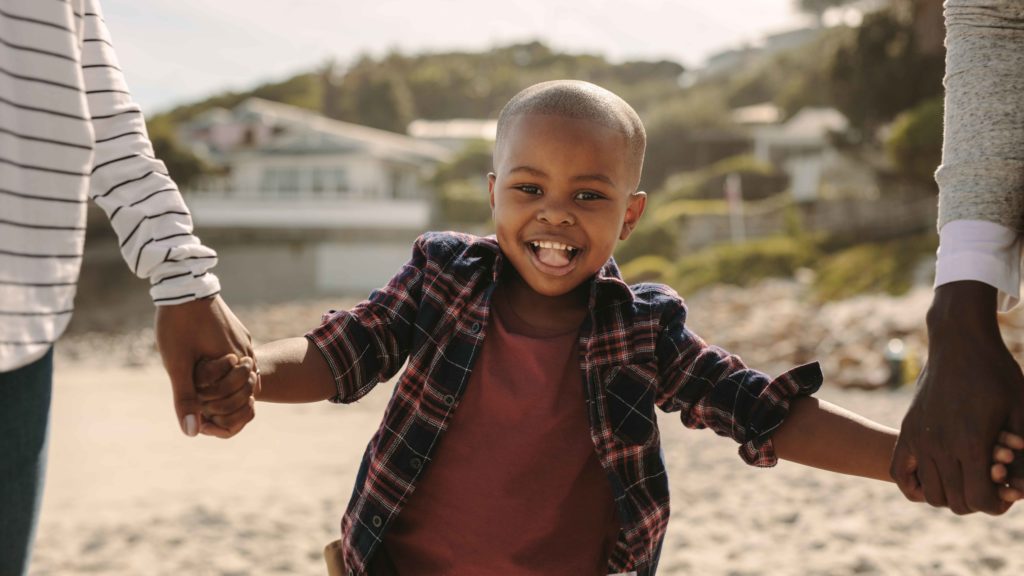
Adopt From South Africa
Many children in South Africa are waiting for a loving, permanent family.
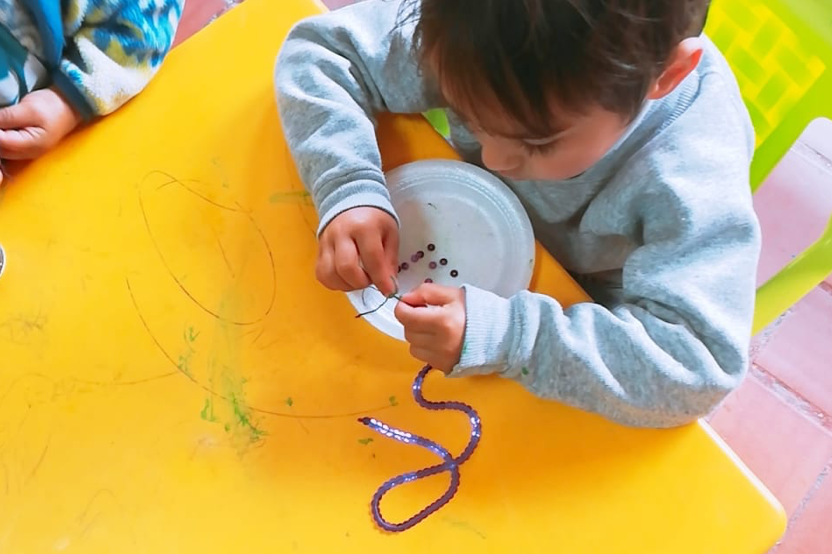

That was the most beautiful story I have ever read. I have often thought about adopting a child with a disability since I am a nurse and have a special bond with one of my pediatric patients! God bless you! What an amazing journey.